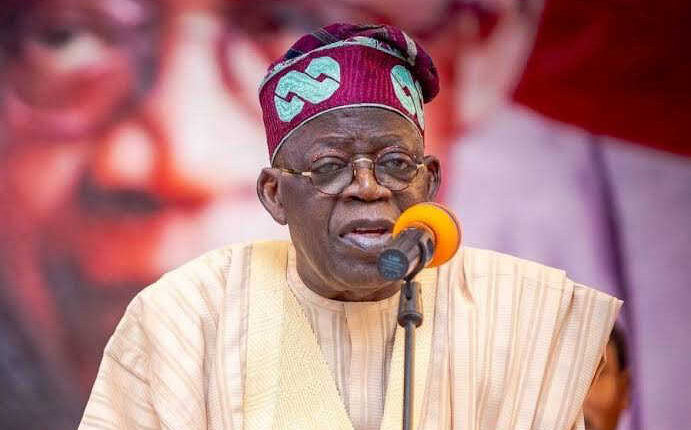Tinubu Claims Food Prices Are Dropping and Hunger Is Declining in Nigeria – Fact or Fiction?
- Advertisement -
Abuja, Nigeria – President Bola Ahmed Tinubu has declared that food prices in Nigeria are falling and hunger levels are declining due to his administration’s policies. However, this claim has sparked controversy, as many Nigerians continue to struggle with skyrocketing living costs and food inflation.
At a Sallah homage event at the Presidential Villa in Abuja, attended by Minister of the Federal Capital Territory (FCT) Nyesom Wike and other officials, Tinubu made several bold claims about the economy.
“Today, we are living in peace, and security is improving. There is satisfaction in our output. Hunger is coming down. Food prices are lowering. We are able to go to the market and do business,” Tinubu said.
- Advertisement -
Tinubu’s Key Claims and Policies
- Food Prices Are Falling – The President asserted that market costs are dropping due to government interventions.
- Hunger Is Declining – He credited this to agricultural reforms and financial policy adjustments.
- Security Has Improved – He claimed better safety conditions are enabling increased economic activity.
- Infrastructure Upgrades Are Effective – He highlighted ongoing projects, such as school and hospital rehabilitations.
Policies Tinubu Cited as Contributing Factors
- Removal of the FCT from the Treasury Single Account (TSA) – Allowing better fund utilization for projects.
- Rural Development Initiatives – Revival of abandoned projects, including the Vice President’s residence and health centers.
- Economic Adjustments – Financial reforms aimed at stabilizing the economy and promoting local production.
But do these claims align with real-life experiences?
The Economic Reality: Data vs. Political Rhetoric
Food Prices and Inflation
Despite Tinubu’s optimism, official data and market surveys paint a different picture.
- Nigeria’s inflation rate hit 33.95% in 2024, with food inflation soaring to 40.66%—the highest in Africa.
- Staple food costs remain high, with rice, beans, and bread still 80-100% more expensive than in 2023.
- Fuel and transportation costs have escalated, further driving up food prices.
Tinubu Seeks New INEC Chairman as 2027 Election Preparations Begin
- Advertisement -
Regional Breakdown of Food Prices
- Northern Nigeria:
- Prices of tomatoes, onions, and peppers fell by 30-40% in some markets due to seasonal harvests.
- However, rice and wheat remain twice as expensive as last year due to forex instability.
- Southern Nigeria:
- No significant price drops in staples across Lagos and Port Harcourt.
- Fish and seafood costs rose by 25% due to high fuel prices.
“The government’s fertilizer subsidies helped some of us, but the benefits are wiped out by high transport costs and insecurity,” said Ibrahim Mohammed, a maize farmer in Kebbi State.
Public Reactions: Do Nigerians Agree with Tinubu?
Many Nigerians took to social media to dispute Tinubu’s claims, citing their struggles with high food prices.
- 91% of respondents in a public poll said they had not noticed any reduction in food costs.
- Critics highlight persistent hunger, rising unemployment, and insecurity in farming regions as key economic challenges.
- Tinubu’s N94 million wristwatch controversy has also fueled skepticism about government spending priorities.
How Does Nigeria Compare to Other African Nations?
| Country | Inflation Rate (2024) | Food Inflation | Key Policies |
|---|---|---|---|
| Nigeria | 33.95% | 40.66% | Subsidy removal, forex reforms |
| Ghana | 25.8% | 30.2% | IMF bailout, agricultural subsidies |
| Kenya | 6.8% | 9.1% | Stable forex, food import diversification |
| South Africa | 5.2% | 7.4% | Strong local production, energy stability |
- Advertisement -
Nigeria’s food inflation is the highest in Africa, indicating deeper economic issues beyond government interventions.
Expert Predictions: Will Food Prices Drop?
- Central Bank of Nigeria (CBN): Predicts inflation may ease to 25% by year-end, but only if forex stabilizes and agricultural output increases.
- IMF Warning: Food inflation may remain above 30% until 2025 without significant policy shifts.
- World Bank: Warns that 25 million more Nigerians could face hunger by 2025 if trends persist.
“We expect food prices to keep rising until at least Q1 2025. The naira’s instability remains the core problem,” says Dr. Muda Yusuf, CEO of the Centre for Promotion of Private Enterprise.
Presidency Responds to Catholic Bishops’ Concerns, Asserts Nigeria’s Progress Under Tinubu
5 Potential Solutions to Nigeria’s Food Crisis
- Immediate Food Import Waivers – Temporarily remove tariffs on staples like rice and wheat to ease shortages.
- State-Supported Transport Subsidies – Reduce food distribution costs by funding farm-to-market transport.
- Government-Funded Food Banks – Expand Lagos’ “Sunday Markets” model to other states.
- Crackdown on Hoarding and Smuggling – Strengthen enforcement against food hoarding and border smuggling.
- Investment in Irrigation for Dry Season Farming – Boost year-round agricultural output to prevent supply shortages.
Final Verdict: Is Tinubu’s Economic Optimism Justified?
While Tinubu’s administration has implemented some reforms, macroeconomic data and public sentiment contradict claims of falling food prices and declining hunger.
- Advertisement -
- Inflation and food costs remain at historic highs.
- Nigerians are struggling more than ever to afford basic meals.
- Economic recovery will take at least 18-24 months with consistent policy execution.
The Big Question: Will Tinubu’s Policies Deliver Tangible Results Before Public Patience Runs Out?
Stay updated on Nigeria’s economic situation – follow us for the latest news.
- Advertisement -


